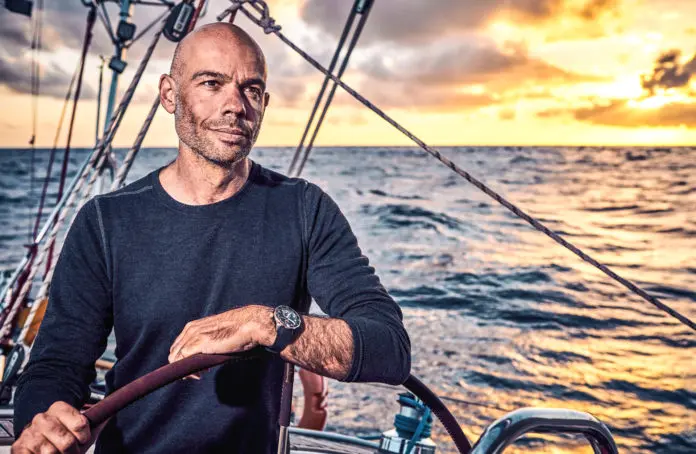I sit down with Belgian freediving legend and 3-time world record holder Fred Buyle to discuss how freediving has impacted his life. We explore his highlights, inspirations, advice, and plans for the future.
DeeperBlue.com: How old were you when you began freediving
Fred Buyle: I started freediving when I was 7 or 8 years old, as far as I remember I always wanted to do that but I never really had the opportunity. I’ve always been passionate about the ocean and wanted to meet the fish that were down there. As soon as I could I grabbed a mask and fins and began to explore. When I was traveling with my parents on the family sailboat I would be in the water as much as I could.
DB: Where did you grow up?
FB: I grew up in Belgium which was not great for water activities but luckily my parents would spend 2 – 3 months a year on the water mainly in Europe and then later further afield. Of course, when you grow up in a country like Belgium you don’t have many opportunities to see the sea too often. That being said I was lucky to have parents that encouraged me to have a love of the sea.
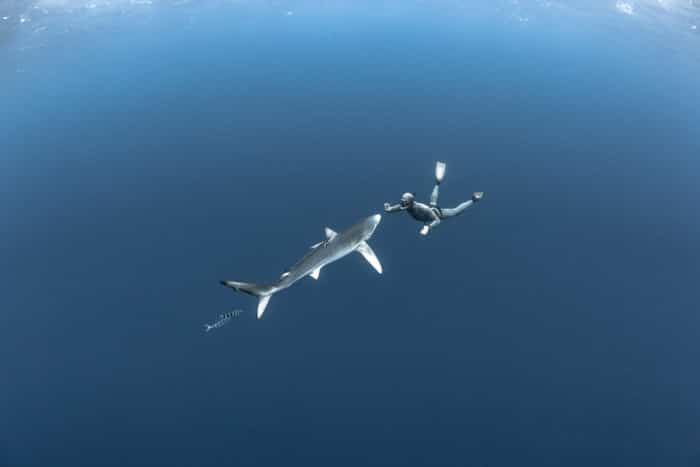
DB: How did the professional side of freediving start for you?
FB: I started teaching freediving when I was 18 years old and while there was nothing orientated around freediving in Brussels I was starting to build a community with friends. Meeting at dive and boat shows was how we started AIDA in 1992. Around that time people were willing to learn and train to be freedivers but there was nothing available so we started clubs and then it took off and from 1994 I was full-on training for competitions and became a professional athlete in 1995/96.
DB: What was your greatest achievement as a professional freediver?
FB: The depths were never really a goal for me. I would say the greatest achievement is for the past 25 years to have the ability to make a living from freediving, every year I wonder if it will still go on but every year you find something else to do and use freediving as a tool.
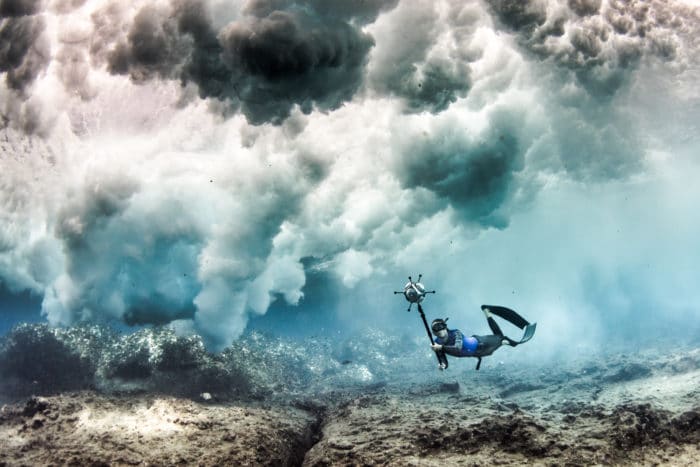
DB: What was your greatest challenge as a professional freediver?
FB: Probably the same thing, always finding new things to incorporate freediving into your living is hard. It seems that whenever the road is ending there is always another opportunity and you have the ability to follow your instincts and go for it.
DB: What is it like to work with productions such as Behind the Mask and BBC? Does it raise awareness for you and the sport?
FB: I think freediving is the future of diving. I’ve been in the general diving industry for 30 years but nothing changed, it’s basically the same people using the same products, just changing the color or the design of the fin… a scuba diving fin is still s**t 30 years after, they don’t change anything. It seems that now people are less interested in scuba. It’s a lot of equipment and becoming more technical. People nowadays want to have fun quicker. On vacation people want to do different, easier things which freediving allows. A diving trip means rest days and surface intervals whereas freediving trips can include other activities such as mountain biking and hiking without the worries of health issues. The recreational freediving market is growing very very fast.
I think also you can associate a lifestyle with freediving which you cannot to scuba. Freediving is similar to snowboarding or surfing where people live that lifestyle and follow a certain mentality.
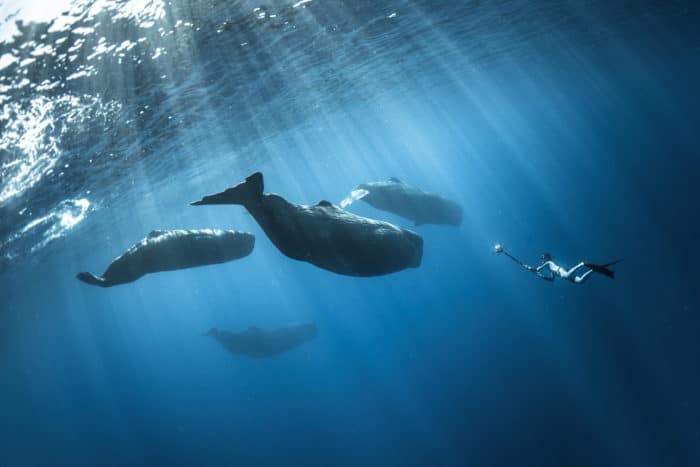
DB: How long have you been in the Azores and what is your best experience in the water there?
FB: I’ve been based here since 2012 and I try to spend as much time as possible here when I’m not on an expedition. What I love about the Azores is that the conditions change all the time, you never know what you may bump into, so anything is possible here, you can encounter any kind of marine life. The conditions you never know, the site can be good or bad visibility, one-day plankton upwelling, the next day crystal clear.
I think the best thing I encountered here was the birth of a sperm whale calf, it was totally mind-blowing. I’ve had so many great encounters.
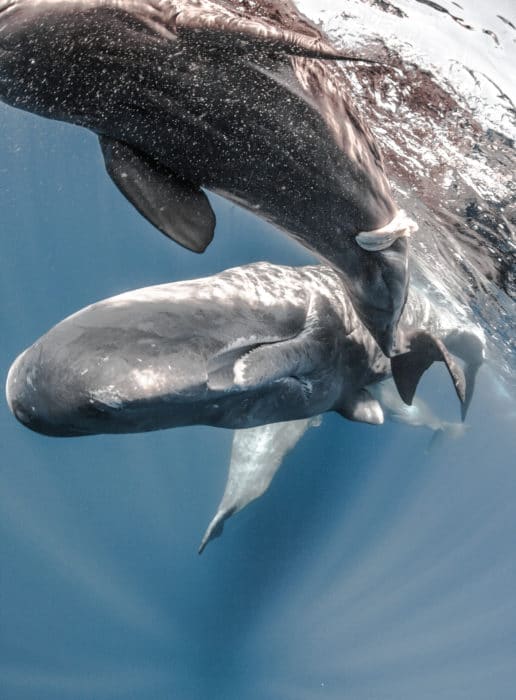
DB: Tell me a little about that experience and how to approach whales underwater?
FB: The funny thing is that I don’t approach the whales, I let them approach me. The problem is the way people interact with whales, using boats the skipper drops the people over the side or in front of the whale and people expect a whale to pass in front of you. This is a problem especially here in the Azores where the whale watching is crowded. Its probably the largest resident population of sperm whales in the world but every time film crews ask me to film here I say no because it’s the place with the worst encounters. It’s ironic but the whales are always on the run and its difficult to have interaction, I think I’ve only had 1 or 2 in 7 years. The key is to let the whale approach and the whale has to make the decision. You have to be far away when you get in the water and if you are lucky enough that the whale comes to you, that’s how you get something special.
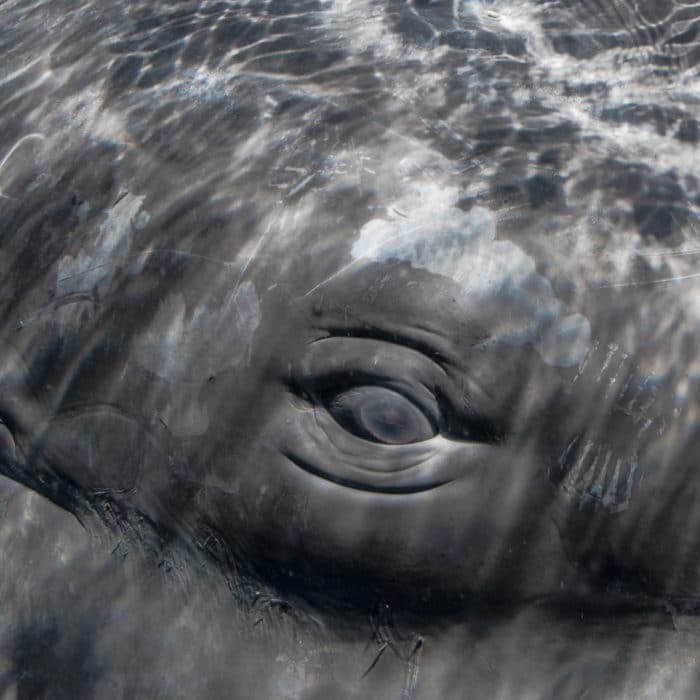
DB: If you could choose your favorite 3 images what would they be?
FB: That’s the hardest question. For me the best images are the ones I never took, they are in my brain, encounters that I had without a camera. I remember, 3 years ago in Princess Alice, I had 2 gigantic Blue Marlin that came and checked me out and then disappeared. Usually, pictures come and go, in my house, I have not and will never put my pictures on the wall. I take pictures to show people the underwater world, what you experience underwater is often engraved in your mind.
DB: Princess Alice Bank is the world-famous spot in the Azores, tell me more
FB: Princess Alice is one of my favorite spots in the world. It’s very remote, 80 km offshore. You’re literally in the middle of the Atlantic. Conditions are difficult and you need a calm day with no swell. Even in the slack tide, there can be a river of current and the next day there is no current and an abundance of animals. The highlight is the mobula ray aggregation, one of the only places in the world to see that. Sometimes we take the sailboat there and have 2 or 3 days to explore the area. Sometimes we see makos and tope sharks in the pelagic zone.
DB: Apart from the Azores, what is your favorite place to freedive?
FB: I love the eastern Pacific, from Baja California to Malpelo and the Galapagos, all these places in the eastern corridors have such a healthy eco-system. Like the Azores, you never know what you might bump into. I’ve been there with scientists for the last 15 years so have got to know the area really well. I’m always very happy to go back there, usually during the winter months. From Guadeloupe down to the Galapagos, it is a very different ecosystem, different species. South Pacific, Polynesia, and the Bahamas are all brilliant with impressive work achieved to protect various species.
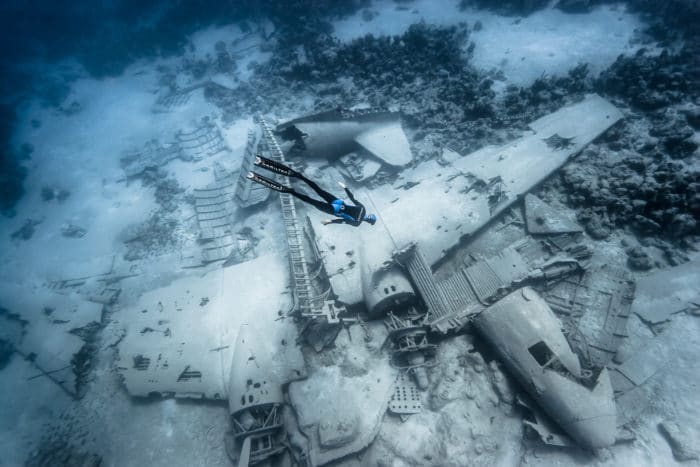
DB: In terms of equipment, what equipment do you use and what do you recommend for beginners?
FB: Equipment is important, especially for beginners, I tell the people I teach that from the beginning to buy good equipment as it will be easier to learn. I always tell people to buy carbon fins even if it’s your first fin because it will be much easier to learn how to fin properly and not with the super-rigid plastic fins. A good, comfortable suit and soft carbon fins are what I recommend.
For the photography now you have more and more cameras, but I suggest investing in a good aluminum housing so less fogging issues. Get good equipment from the beginning and then the experience will be much better.
For me, I work with Mares as an ambassador and while they offered me custom made suits with any neoprene I wanted, I still dive in the off the shelf freediving 2 pieces. For cameras, I am a Nikon ambassador and switched to their cameras 3 years ago. I work now with the new mirrorless system which is amazing. The Z series is very small, rugged and ergonomic and sits perfectly in the Subal housing. Traveling light and small is so beneficial. Reducing the carbon impact as much as possible is the way to be, my boat is built especially to burn less fuel.
DB: In the freediving community is there a particular person you admire or would like to work with?
FB: I’m not really involved with the freediving community anymore as I try to work with people outside the community, this way you get a different take on it and interesting opinions. But otherwise, someone like Umberto Pielizzari was a good inspiration and is the one that took freediving from an obscure activity to a mainstream sport in the 1990s. He’s also a great human being… it helps.
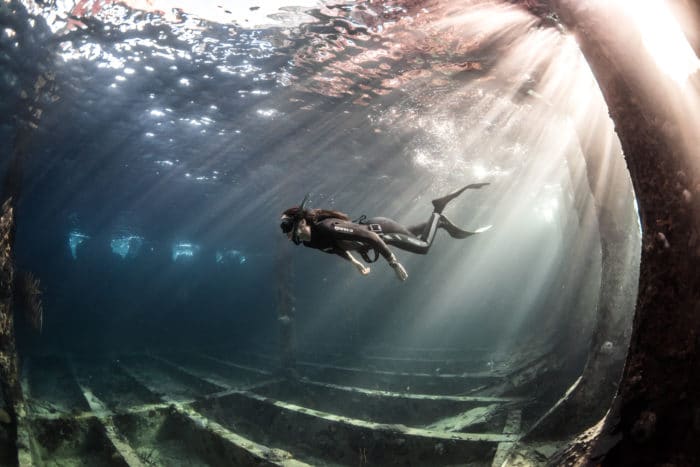
DB: What is your opinion on spearfishing and is it a good sustainable way to live?
FB: Spearfishing is a very difficult question; I spearfish and I have no problem with it. It’s about how you do it, I think you should just go out and just get a fish to eat, like one or two fish. I hate trophy hunting, I see people shooting big fish and I don’t see the point, I think its just ego driven. You don’t need to shoot a 50 kg amberjack or a 200 kg tuna as they are the big reproducers. The great thing about spearfishing is it’s totally selective, you can choose exactly what you want, the size, sex, and species. It’s the ultimate way of hunting animals and getting exactly what you want. I’m very critical of spearfishing competitions and trophies and records. Spearfishermen should be more responsible. Education, rules, and licenses should play more of a part.
DB: Any upcoming plans?
FB: The season is about to begin in the Azores as the water is getting clear, after the summer I will go to Mexico in October and November to work with scientists. After that Norway for the winter. I’m working on a pre-production script at the moment for a big upcoming shark documentary focusing more on the animals instead of humans.

